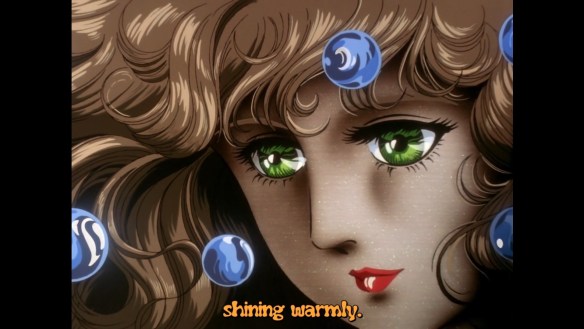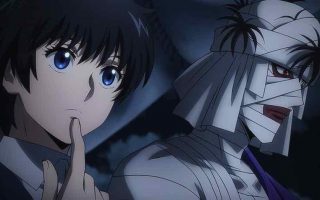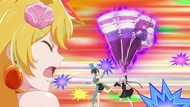Hello folks, and welcome back to Wrong Every Time. Today I am happy to announce we are returning to the tormented halls of Seiren Academy, as Nanako endures a fresh collection of schemes and crashouts and ornately illustrated sorrow, all so she can achieve a god damn high school education. Do they even have classes at this school? I can’t imagine where they’d find the time for them, what with all the backstabbing and plotting and hopelessly draping themselves across school furniture all the students pack into their schedules.
Nanako is certainly receiving an education in something, though. As our last episode demonstrated, she is becoming a key fixture in the lives of both Kaoru and Saint-Juste, a confidant and tether maintaining their connection to this fragmentary, floating world. Though Nanako sees herself as perfectly ordinary, her ability to pierce the veils enshrouding Seiren’s three icons nonetheless makes her a unique quantity, as the one person able to see them as normal, reachable fellow students, rather than visions of Icarus that can only be glimpsed from a great distance. And in Dezaki’s hands, both the luxurious splendor and woeful melodrama of these stories is brought vividly to life; rather than abstracting Ikeda’s cast into caricatures, this adaptation simply realizes their feelings at the tenor they are experienced, offering the delightful two-cakes pleasure of both indulging in wild dramatic excess while still enjoying a story about recognizably human characters.
Well, except maybe Shinobu, that girl is something else. But that is also why we love her, and I’m eager to see what nonsense Nanako’s self-assigned nemesis is plotting as we return to Dear Brother!
Episode 10
“For you, for love, I would empty the bowls of my past.” That seems to be what Seiren offers – a chance for total reinvention or surrender, to submit yourself utterly to the tempestuous relations and all-consuming social clubs of the academy
To avoid such a fate requires the grounding of a stable personal life that someone like Shinobu or Saint-Juste clearly lacks. Nanako’s own confidence in self is a product of three personal pillars: her parents, her friend Tomoko, and her confidant Dear Brother. Given we’ve at times seen both her parents and Tomoko become as strangers to her, it’s easy to see how someone else might be swept up in Seiren’s magic, and equally apparent how crucial her assumed brother has been in maintaining her sense of self
We open on a reprise of our last finale, as Shinobu stares down at her dinner while sweating bullets, ultimately upending the table as she screams “get out of my life!” Shinobu has some large, complicated feelings
It is excellent to populate your character dramas with multifaceted, recognizably human characters, but it also nice to create a gremlin or two who continuously causes problems on purpose
Back in class, Shinobu makes tentative steps to reconnect with Nanako, tossing her eraser over to her neighbor’s desk. This is part of why high school makes for such delicious narrative drama – you’re all trapped in close proximity with no agency regarding who you associate with. Shinobu might have declared she was going to kill Nanako and then herself yesterday, but she’s still gonna be her seat neighbor today
The best Nanako can achieve is the silent treatment
Wildly expressive cut of Tomoko at lunch, as she conducts the conversation with her fork before monching her hamburg steak. One of the rare inclusions by series ace Masahiro Ando, who also handled most of the cuts of Kaoru playing basketball, as well as that sequence of Saint-Juste flinging daggers past Nanako’s head. Dear Brother’s art design and boarding are so good that it rarely requires fluid motion, but it’s always welcome; generally the key moments of movement are designed to emphasize the larger-than-life nature of Seiren’s idols, but here, the buoyancy of Tomoko infers a sense of comfort, an implication that life has returned to these lighter, more carefree topics of conversation
Still, Nanako can’t help but scan the veranda for a lurking Shinobu
“Mariko.” Hoo boy
Shinobu is of course lounging dramatically on the school roof, wind rippling through her hair as she schemes fresh heresies. She is discovered by Kaoru
Shinobu flees from her concern, vowing “I WILL NOT EAT.” So, just another day for Shinobu, then
“Mariko, what do you want for dinner?” Bless her mother, who seems pretty accustomed to these sorts of performances
“Can’t you say anything but ‘please?’ Being like that is what made father… get out!” So Shinobu sees her mother as weak and ineffectual, blaming her refusal to pursue her desires for her father’s absence. That goes some distance towards explaining why she is the way she is – she believes we gain nothing in this world but what we take by force, and she is determined to take Nanako
“You’ve been studying so hard lately.” Shinobu’s fragmentation is contrasted against Nanako’s apparent mental health; it seems Nanako is finally just enjoying school like your average student
Both parents praise her for her studies, a heavy-handed but nonetheless welcome confirmation that she has regained her closeness with her family
“I don’t think I care how they met.” If Nanako can acknowledge what she cares about without guilt or regret, she will have overcome the most fundamental psychological challenge of high school: coming to know and love yourself well enough to admit who you are with pride
She’s feeling so confident, in fact, that she nearly calls Shinobu to check on her, before quickly slamming the phone down
Fukiko-sama requests that Nanako and Shinobu gather flowers for a coming tea ceremony, with her subordinates stating they’ll “rely on your good taste” in choosing the flowers. More power games, Fukiko forcing subservience from her followers in order to bind them all the closer to her, but reserving the right to judge their choices, thus making them feel like she’s doing them a favor by relying on and hopefully praising them. I wonder if Fukiko is additionally aware of the tension between Nanako and Shinobu, and wishes to exploit it
A montage demonstrates Shinobu filling the air with small talk regarding their sorority duties, an efficient way to illustrate their lopsided conversation
When Shinobu attempts to bring up the birthday party, Nanako flees. Repeated imagery of a fall from grace – first rain falling down Nanako’s window like tears, now this rose drifting free from Nanako’s bouquet
“A Tea Ceremony? What an elegant life!” Tomoko immediately serves as a grounding influence, keeping Nanako from getting too accustomed to the glamour of the Sorority
Kaoru once again attempts to reach out to Shinobu, telling her she has to eat something to maintain her health
“What good is health!? Who needs health!?” Shinobu’s careless words obviously strike abrasively against Kaoru, given her inescapable health problems. Who is Shinobu, to so thoughtlessly disregard such a precious gift?
Kaoru actually lifts her straight off the ground to yell at her
Still, Kaoru seems determined to pay Nanako’s consideration forward. Shinobu eventually lets the tears flow, collapsing in Kaoru’s chest – only for the nattering peanut gallery to say “oh, I want Kaoru-no-Kimi to hold me, too.” Everything here is a performance to them; the school icons and those who associate with them are not people, they are stage props
Clear parallels here to Revolutionary Girl Utena, which was undoubtedly influenced by Dear Brother’s emphasis on high school as public performance, where true feelings bleed into the personas we adopt for the crowd
Kaoru literally towers over her fellow students, her size exaggerated to emphasize her grand social stature
We pan up across a mournful Shinobu and then down across a lounging Saint-Juste, a visual parallel emphasizing how both of them seem to almost luxuriate in their sorrow, finding surrender to the sadness more tenable than Kaoru’s persistent rallying against the darkness
“Why don’t you come up here instead of playing with your stupid ball. The view from here is wonderful. Everything looks small and beautiful.” Saint-Juste would rather admire the vitality of life from a great, protective distance, rather than embrace the pain of recommitting to the world
Saint-Juste almost agrees to join them, but then that bastard Miya-sama appears, and Saint-Juste nearly plummets off the balcony. Whenever it seems like Saint-Juste might rejoin the living, Miya-sama appears to remind her she is a damned soul, unfit to live carelessly with her peers
The parallels between Saint-Juste and Shinobu are emphasized further as Shinobu collapses on the court, presumably defeated by her hunger strike. Love how the Seiran tower looms in the distance of this shot of Shinobu collapsed, as if proudly overseeing the mental collapse of its students
“Despite everything, she’s still my friend.” And Tomoko smiles at this, knowing this is not a threat to their friendship, but simply a reflection of Nanako’s general kindness. So glad to see these two patched up
Meanwhile, Shinobu’s mother spies her former husband while out shopping; he departs with a young red-haired woman in a sports car. All of this episode’s focus characters believe their window for happiness has passed, and that they can now only sorrowfully observe the world of the living
“Stupid girl… abusing her precious life like that.” Kaoru reflects bitterly on both Shinobu and Saint-Juste. How can they so casually discard the health she could never hope for?
Lightning thunders over a can of crab meat as Shinobu’s mother hears the news, a neat encapsulation of Dear Brother’s ever-so-slightly tongue-in-cheek approach to its melodrama
Her mother reveals that Shinobu was refusing to eat until Nanako forgave her. You can’t blame yourself for that, Nanako!
“Kaoru-no-Kimi… you waited here for me all this time?” Shinobu is clearly starved for positive attention, but can only find unhealthy vehicles for pursuing it. Her father’s exit has warped her perspective on relationships; she believes intimacy must be demanded, or claimed by force, lest the target of your love flee and abandon you
“What? I don’t need you. I have a lot of friends,” says Shinobu to Nanako. Alright sweety, that’s fine
Still, tsundere Shinobu is a huge improvement over self-destructive Shinobu
Her mother attempts to reach her father to explain what’s happened with Shinobu, but no one answers. Like mother, like daughter
But then he arrives! The school called his publisher!
And this flash of hope is mirrored for Shinobu as well, as Nanako tentatively reaches out and takes her hand
And Done
Oh my poor Shinobu, how the world torments you! Through this episode’s constant visual and narrative parallels, Shinobu was framed as one in a company of lost souls, those like Saint-Juste or her own mother, who see themselves as irreversibly severed from the brighter things in life. And while all that confident visual storytelling was well and good, I was even happier to learn so much more about Shinobu’s relationship with her father, and how her broken home has informed her understanding of loyalty and love. Shinobu’s a mess, but she feels like a far more human mess after this episode, which managed to maintain her theatricality while tethering it to a sympathetic void in her heart. And now our girls have reconciled! I’m not sure if Shinobu will be any more sane now that Nanako has affirmed their friendship, but I’m eager to see her once again serving as our heroine’s ferocious protector, calling their fellow classmates daughters of rat-dogs and the like. There’s never a dull moment at Seiren Academy!
This article was made possible by reader support. Thank you all for all that you do.




